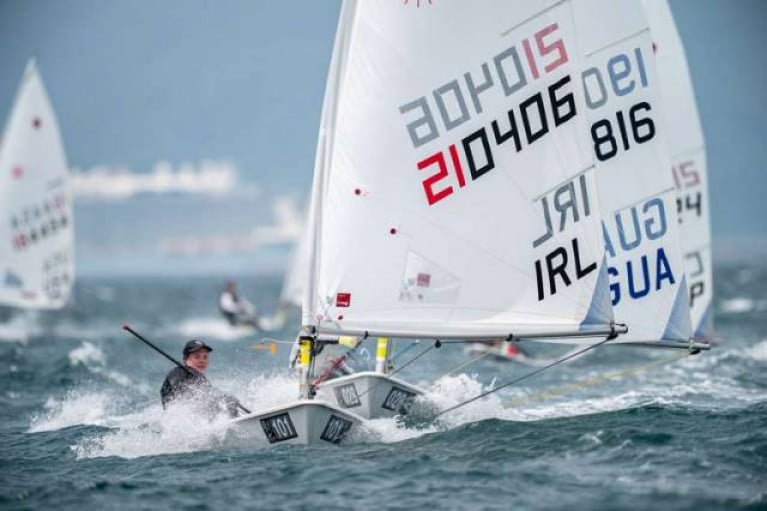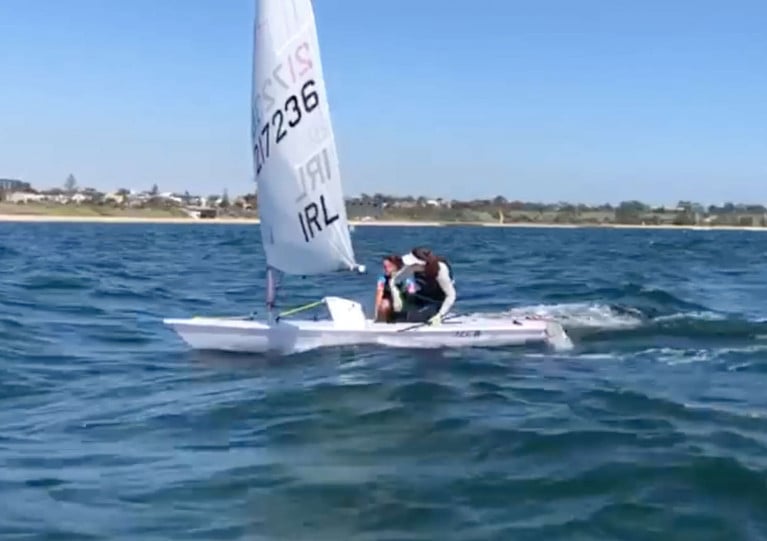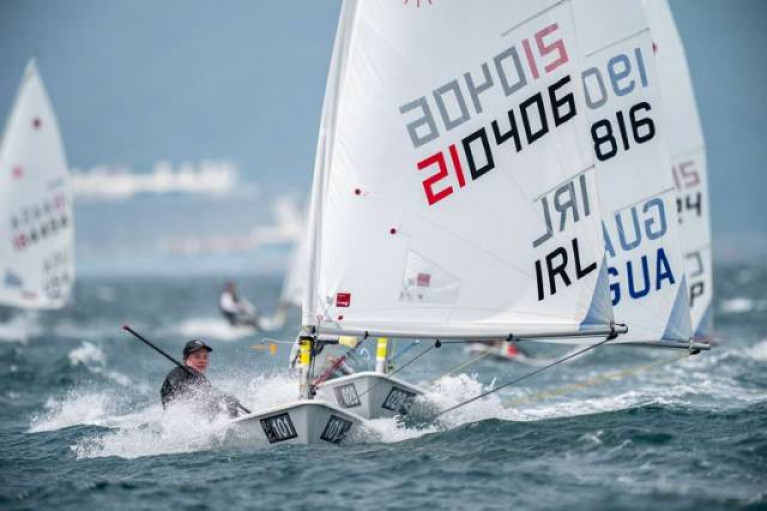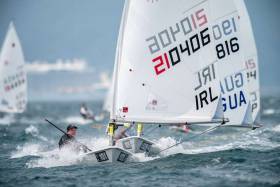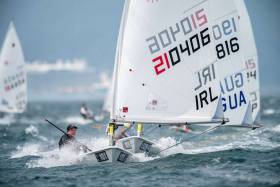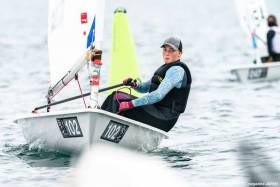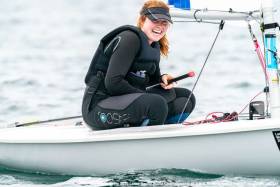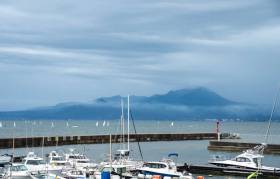Displaying items by tag: Aisling Keller
Tipperary Laser Ace Aisling Keller Coaches Rush Youth Sailors
Rush Sailing Club hosted Tokyo Olympic campaigner Aisling Keller from the Irish Laser Association for a two day Laser dinghy training course for 13 of its junior members on January 22/23.
A report from the club's Michael Gosson says "the Juniors got some great experience under super guidance from Aisling".
"They were fully engrossed in the theory and debriefing lessons afterwards; The quietest we have seen them and all excitedly chatting in the club at the end of both days", he said.
 Aisling Keller (front row second from right) and the Rush Sailing Club juniors
Aisling Keller (front row second from right) and the Rush Sailing Club juniors
Rush Sailing Club is hoping the dedicated Keller who hails from Lough Derg will return for more sailing on the Rogerstown estuary soon.
As regular Afloat readers will know, the Tipperary Laser ace qualified Ireland for the Tokyo Olympics in the Laser Radial class at the 2019 World Championships only then to be ruled out of contention due to a cut short trials series, an ad hoc change to the selection procedure by the Irish Sailing Association that left Keller 'devastated' and drew the ire of many observers.
Aisling Keller Has Every Right to Feel Hard Done By Over Olympics Exclusion, Says Nenagh Guardian
The process by which Laser Radial sailor Aisling Keller was excluded from this summer’s Olympic Games “leaves a lot to be desired”, according to an editorial in her home town’s newspaper.
The Lough Derg Yacht Club racer secured Ireland’s Laser Radial spot in Tokyo with a strong performance at her class’s Worlds in Japan two years ago.
But Nenagh native Keller was denied a chance to compete for that place when last year’s Olympic trials were cut short amid the early months of the COVID-19 pandemic.
Instead, Irish Sailing opted to select Rio 2016 silver medalist Annalise Murphy — a recent returnee to the class after an abandoned run in the 49erFX.
As previously reported on Afloat.ie, Keller and fellow hopeful Aoife Hopkins were respectively “upset” and “devastated” by the decision.
And the Nenagh Guardian editorial says Keller has every right to feel hard done by.
“Now, Annalise might well be our best chance of winning a medal,” the paper writes, “but being handed the opportunity was blatantly unfair, when over the last twelve months, a competition could have taken place on these shores for both, or indeed Aoife Hopkins and Eve McMahon who were also in the running.”
The editorial makes no bones about the situation as it sees it: “Where competitors for Olympics are based on selection rather than out and out competition, it is open to bias and influence and it is hard not to feel that Keller … just didn’t have the right connections with the right people compared to others.”
Irish Sailing said at the time of its announcement that “Annalise’s performance in the 2020 Worlds made her a clear favourite to win the scheduled trials. By nominating her now, the Irish Sailing Board has ensured that team preparations can focus on the Olympics rather than preparing for domestic trials”.
A cut-short Olympic trial in the women's Laser Radial class has handed trials leader and Rio silver medalist Annalise Murphy selection for the Tokyo Olympics as Afloat reports here. News of this week's decision, however, has left two of the trialists, Aoife Hopkins and Aisling Keller, 'upset' and 'devasted' and questioning why the decision was ratified by the Irish Sailing board with the postponed Olympic Games still over a year away.
A third trialist, Irish Sailing Academy sailor Eve McMahon, says the circumstances of COVID-19 could not be foreseen and the trial, in so far as it went, was a 'tremendous experience' for her.
The remaining two Olympic trials events have been cancelled due to coronavirus and – as the four trialists were informed this week – selection has been based solely on the worlds from February, an event in which the National Yacht Club's Murphy finished 12th, well clear of her Irish rivals.
Keller of Lough Derg Yacht Club whose performance at the 2019 Australian World Championships qualified Ireland's only boat for the Tokyo Olympics so far, said she is "very surprised and upset that the remainder of the trials will not happen for the 2021 Olympics".
21-year-old Hopkins of Howth Yacht Club gave a similar reaction, "I really can’t understand the decision not to continue with the trials. I am utterly and completely devastated".
Both Hopkins and Keller were quick to take to social media to express their disappointment.
Both sailors say they were aiming to catch up in the next two trials after Murphy took the lead in the first of the three planned trials in a breezy world championships in Melbourne in February.
"Over the past few years, I’ve sacrificed a lot to fulfil my dream of becoming an Olympian. I am devastated to not even have the chance to try catch up to Annalise or Aoife over two more regattas, Keller says.
A third trialist, McMahon of Howth Yacht Club, current Gold Medal holder in the Laser Radial U17s World League after success in Canada joined the trial series at Christmas and told Afloat of the 'amazing opportunity to sail and train with the Olympic Radial Development Team'.
Read the full comments below
Team manager James O'Callaghan says "Annalise’s performance in the 2020 Worlds made her a clear favourite to win the scheduled trials. By nominating her now the Irish Sailing Board have ensured that team preparations can move focus to the Olympics rather than preparing for domestic trials”. He went on to say: “for sure this is tough on Aoife but she is still very young and can benefit massively from team training planned in Tokyo".
Murphy who returned to the Radial after failing to qualify for Tokyo in the 49erFX dinghy made an immediate impact on the Radial fleet, coming close to winning the Melbourne Worlds before finishing 12th after taking two penalties in final races.
Radial Reaction
 Aisling Keller - surprised and upset that the remainder of the trials will not happen for the 2021 Olympics
Aisling Keller - surprised and upset that the remainder of the trials will not happen for the 2021 Olympics
Aisling Keller: “On Monday I got a courtesy phone call to be informed that The Olympic spot had been given to Annalise. I am very surprised and upset that the remainder of the trials will not happen for the 2021 Olympics. Over the past few years, I’ve sacrificed a lot to fulfil my dream of becoming an Olympian. I am devastated to not even have the chance to try catch up to Annalise or Aoife over two more regattas. I was planning on doing these regattas independently i.e not with Irish sailing, as I had resigned from Irish sailing in April due to my own lack of progress and my unhappiness with how I had been treated. I would like to take this opportunity to thank all my supporters for everything over the past few years, especially everyone down in Lough Derg Yacht Club and my home town of Nenagh".
 Aoife Hopkins - taking some time out for reflection and to reassess
Aoife Hopkins - taking some time out for reflection and to reassess
Aoife Hopkins: “On Monday I was told that Irish Sailing did not intend to reschedule the remaining two trials events. I really can’t understand the decision not to continue with the trials. I am utterly and completely devastated. I am going to take some time out for reflection and to reassess. A huge amount of hard work, dedication, blood, sweat and tears went into this journey and I will use the next while to decide what direction my life will take. No matter what path I end up on, I will always be a sportswoman and an avid sailor, whether that be big boat or small! I would like to thank my family, friends and all my supporters both from within sport and the wider community, especially from my home town of Howth".
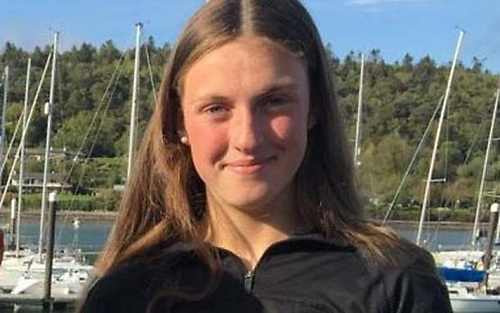 Eve McMahon - an honour and a privilege to be training alongside Annalise Murphy
Eve McMahon - an honour and a privilege to be training alongside Annalise Murphy
Eve McMahon: “I had an amazing opportunity to sail and train with the Olympic Radial Development Team. Training alongside the Olympic medallist Annalise Murphy was both an honour and a privilege for me and gave me tremendous inspiration and experience which helped me enormously during the run up to the 1st Olympic trial - Senior World Championships in Melbourne last February. The trial selection process was interrupted by the Covid 19 world pandemic, which nobody could have foreseen. Annalise was a whisker away from winning that World Championship. I fully support her selection and wish her the very best of luck in her Tokyo campaign and have great confidence that she has what it takes to bring back the gold medal for Irish sailing.”
The Heat Is On For Ireland’s Quartet Of Laser Radial Sailors Competing For Tokyo Olympic Spot
In her latest column for The Irish Times, athletics great Sonia O’Sullivan meets the four women in contention for Ireland’s sole Laser Radial spot at the Olympic Games in Tokyo this summer.
After frustrations in her attempt to qualify in the two-handed 49erFX class, Annalise Murphy is back in the boat with which she won silver at the 2016 Olympics — Ireland’s strongest Olympic sailing result to date.
But this time there is tough competition from three women who were still coming up when she was racing for that medal in Rio — namely Aisling Keller, Aoife Hopkins and 15-year-old Eve McMahon.
All four have been training together in Melbourne, Australia since the start of the year, ahead of the Laser Radial World Championship (starting tomorrow, Friday 21 February) which will be the first of three chances between now and April for one of them to secure that coveted spot.
“Think about how that must be for them,” writes Sonia. “They know that only one of them will go to Tokyo so they wouldn’t be human if they didn’t have some sort of selfish instinct in them. It would be only natural for them to keep little bits and pieces that they’re learning back for themselves to give them a better chance of being the one who gets the spot on the boat.
“But they also know that the more they push each other, the better they make each other. And the better they make each other, the greater chance of a medal for Ireland and a better all round result for Irish sailing.”
Sonia also gets out on the water with Annalise to experience first-hand the speed and excitement of the Laser Radial — and the rush Annalise and her fellow challengers will be feeling when the training is done and the race is on.
Aisling Keller Shortlisted For Her Sport Young Athlete Of The Year
Lough Derg Yacht Club’s Laser Radial contender Aisling Keller has been named in the shortlist for Her Sport’s Young Athlete Of The Year gong, voted on by the website’s readers.
She joins a list with nine other remarkable Irish sportswomen who “provided some of the most thrilling and memorable moments, in what was arguably one of our greatest sporting years of all time”.
Keller, who secured her place at the Tokyo Olympics at the Laser Worlds last July, was also named Afloat’s Sailor of the Month (Olympic) for November as is in the running for the overall award next month.
Aisling Keller is Sailor of the Month (Olympic) for November
November is stock-taking time in a pre-Olympic year with the international championship programme about to get under way in the Southern Hemisphere, and the review of Irish Olympic hopefuls during the 2019 season shows that it was Aisling Keller of Lough Derg YC who spearheaded the vital results which secured Ireland’s place in the Laser Radials by taking seventh among Olympic potentials in the selection series at the Worlds at Sakaiminato. The all-important place is secured, but the sailor who actually fills it will be determined by a gruelling selection process spread over three international regattas in the first part of 2020, involving four sailors: Aisling Keller, Aoife Hopkins (who was also in the top ten at Sakaiminato), U17 World Champion Eve McMahon, and 2016 Olympic Silver Medallist Annalise Murphy
Following the final two races at the Laser Radial World Championship this morning, Ireland has qualified for the Tokyo 2020 Olympic Sailing regatta in the women’s single-handed event, the only sailing discipline so far in which Ireland has qualified.
The berth was secured by the current Irish Radial Champion, Lough Derg Yacht Club’s Aisling Keller (Nenagh, Co. Tipperary) who had her best day in the Gold fleet final series to finish 46th overall in the 56-boat Gold fleet.
“This is a weight off my shoulders for sure, it’s probably the hardest regatta I’ve ever sailed,” Keller said. “To come in off the water and know that it’s done and dusted is just amazing (I’m) so happy.”
Howth Yacht Club’s Aoife Hopkins placed 48th and both Irish sailors were inside the qualification criteria with Keller taking the seventh of ten-nation places decided at the championship. Hopkins would otherwise have been in the ninth nation place.
“It’s been a really long road to this moment. We’ve been working for a year towards this event particularly and even longer towards Olympic qualification,” said Hopkins. “It’s really nice to come away with the outcome we wanted.”
The world championship was won by Denmark’s Anne-Marie Rindom who led overall going into to the final day of Gold fleet racing on Wednesday. Ten nation places for Tokyo 2020 were also decided at the event in addition to the 20 already won in 2018.
Now that Ireland has qualified, an Irish Olympic Trials Series will be held to determine which sailor represents Ireland in Tokyo. More details on the Olympic Trials format is here.
“Qualification was something that had to happen so that ended up being the focus here at the end of the regatta,” said Rory Fitzpatrick, Irish Sailing’s Head Coach. “Next we go to the Olympic venue (at) Enoshima… now that we know we’re going to be there (at the Games) we’ve got to make the most of it.”
The sailing venue for next year’s Olympic regatta will host national representatives in all events next month for a scheduled test series for competitors and organisers alike.
Results here
Both Aisling Keller (Nenagh, Co. Tipperary) and Aoife Hopkins (Howth, Co. Dublin) qualified for the Gold fleet final round at the Laser Radial World Championship at Sakaiminato, Japan earlier today (Sunday 21st July 2019).
The event is the penultimate qualification regatta for the Tokyo 2020 Olympics in the women's single-handed event sailed in the Radial.
After two days of light winds that put the championship behind schedule, the fleet had a protracted third day afloat for eight hours as the organisers staged three races to catch-up on most of the event schedule.
Both Keller and Hopkins had two good results apiece with an eighth and an eleventh respectively that leaves them 29th and 37th overall at the end of the qualification series for the 111-boat event.
A six-race Gold fleet series begins on Monday with two races scheduled daily before concluding the world championship on Wednesday.
A total of ten-nation places are available from the world championship for Tokyo with 14 countries in the Gold fleet all seeking one of the quota. Both Keller and Hopkins are currently inside the qualification standings.
"It was a challenging day to be consistent with winds ranging from fresh to moderate to light but flukey at all times," commented Rory Fitzpatrick, Irish Sailing's Head Coach. "The plan continues to be to sail one race at a time as a very tough Gold fleet final round lies ahead."
Results are here
Lough Derg Yacht Club's Aisling Keller Continues to Lead Irish Laser Radial Hopes in Japan
Lough Derg Yacht Club's Aisling Keller continues to lead Irish hopes of Olympic qualification at the Laser Radial World Championships today.
Both Irish women competing at the World Championships in Sakaiminato, Japan achieved top 20 results as the pair aim to secure the single place for Ireland at the Tokyo 2020 Olympic Games.
Aisling Keller (Nenagh, Co. Tipperary) had a 14th place while Aoife Hopkins (Howth, Co. Dublin) was 17th in the single race day for their 55-boat Blue flight.
The moderate breeze that the two qualification flights started in proved quite unstable and soon eased to near calm conditions. Plans for a second race were dropped.
As Afloat reported previously, a second day of slack winds on Miho Bay has put the qualification round behind schedule and while three races may be attempted on Sunday, the finals series must begin on Monday regardless.
Two races on Sunday would see the series discard come into force and allow Hopkins to drop her 34th place from the opening day to maximise her potential to achieve Gold fleet for the finals.
“We have good momentum now so I’m pretty happy that Aisling and Aoife have settled in,” said Rory Fitzpatrick, Irish Sailing’s Head Coach.
Ten nation places for the women’s single-handed dinghy in Tokyo will be decided at this world championship in addition to the 20 already allocated from 2018 events. Either or both Irish sailors must first qualify for Gold fleet on Sunday and score well by Wednesday’s final race to achieve Irish qualification.
Lough Derg's Aisling Keller Leads Irish Hopes for Olympic Berth at Radial Worlds Japan
Aisling Keller of Lough Derg Yacht Club leads Irish hopes in chasing one of ten Olympic places at the Laser Radial World Championship at Sakaiminato, Japan today.
Near-calm conditions made for a tricky opening day where Ireland has two sailors aiming to qualify for the women’s single-handed event at the Tokyo Olympics next year.
Only one of two races was held and a big shift in wind direction eventually saw the course shortened after three legs.
The first three days of the event are qualification rounds with the 111 entries split into Blue and Green flights. Both Aisling Keller (Nenagh, Co. Tipperary) and Aoife Hopkins (Howth, Co. Dublin) are currently sailing in the Blue group.
National Radial Champion, Keller sailed well in the shortened race, reaching as high as tenth place with the leaders and consistently held a top 20 position to eventually place 16th for the first day.
The 40-degree wind-shift caught Hopkins on the wrong side of the course and she ended in 34th place with no opportunity to recover places when the race ended.
“Both our sailors are sailing well considering the conditions,” commented Rory Fitzpatrick, Irish Sailing’s Head Coach. “Aisling’s result is definitely a ‘counter’ but Aoife was unlucky that the race was shortened.”
Although the opening-day of racing faced light conditions, forecasts for Saturday suggest an improvement with around ten knots of breeze expected.
Ten nation places for Tokyo are available at the end of this event following the 20 places already allocated out of a total of 44 berths in the women’s event at the next Olympics.
Results here


























